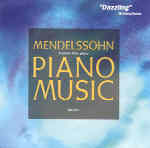Harmonia Mundi gives Frederic Chiu’s 1993 all-Mendelssohn recital a new, budget-priced lease on catalog life. The composer’s piano sonatas receive little attention on disc, let alone in concert, and Chiu’s conceptions provide much food for thought. His rounded detaché articulation and keen attention to voice-leading and tone color especially pay off in the E major sonata’s inner movements. The Adagio’s polyphony seems to emerge from different instruments, courtesy of Chiu’s extraordinary finger control and sparse pedaling. These virtues add up to even more impressive ends in the G minor sonata, where the Allegro and the Presto movements’ scampering scales and runs arguably surpass Benjamin Frith’s poise and suppleness. The same comparison holds true for the B-flat sonata’s Scherzo, although I prefer Frith’s lyric flexibility in the outer movements to Chiu’s squarer metrics.
The Rondo Capriccioso, however, suffers from prissy rubatos and arch underlinings that you might associate with bonafide Romantic pianism–except for the fact that old-timers who recorded this work, such as Hofmann, Cortot, Friedberg, and even the eccentric De Pachmann, played this piece absolutely straight! I also should mention Murray Perahia’s equally refined and less-studied recording of Op. 6, while singling out as a personal favorite Karl Ulrich Schnabel’s still unsurpassed dynamism and galvanic momentum in the Finale. Harmonia Mundi’s engineering, while full-bodied and true to the instrument, is drier than normal for its piano recordings.
































